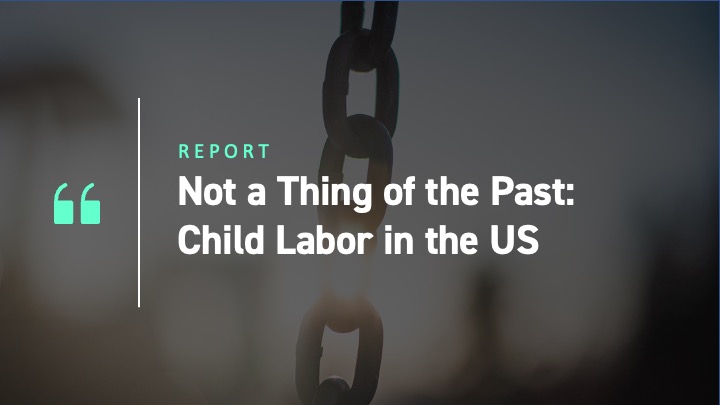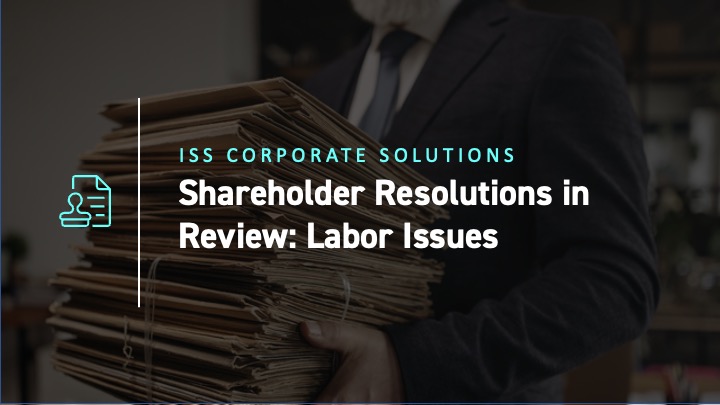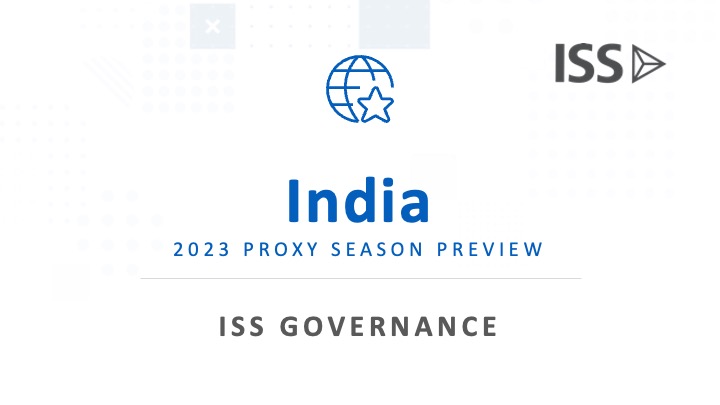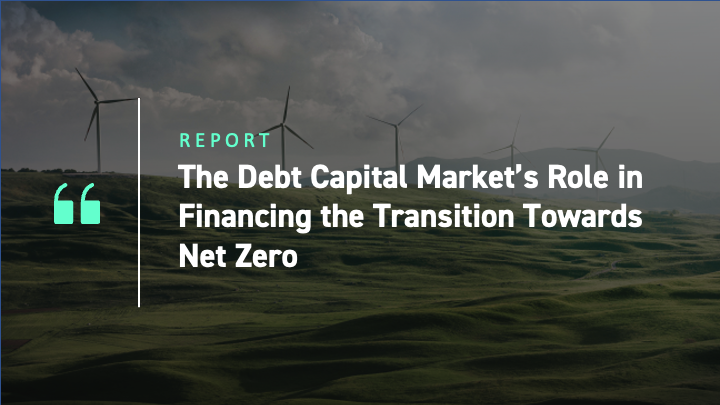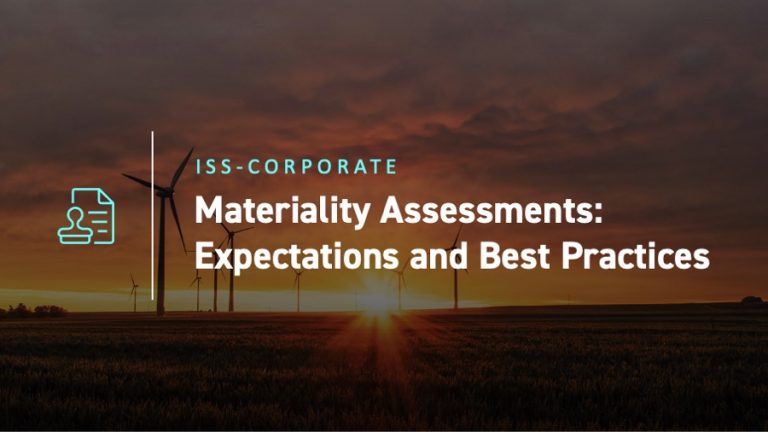Child Labor in the U.S.
U.S. officials have reported that child labor cases, far from being a problem of the past, have increased significantly in the United States over the past five years. A recent investigation by the New York Times found children working exhausting and often highly dangerous jobs across the United States in violation of child labor laws.
Most underage workers are migrant children from Central America who have arrived in the United States without their parents. Companies in the Automobile, Food Products, and Retail industries seem to be especially exposed to child labor risks.
ISS ESG’s Norm-Based Research assesses companies’ adherence to international norms on human rights, labor standards, environmental protection, and anti-corruption. Norm-Based Research data on cases of child labor across geographies illustrate that the U.S. is the only OECD country, besides Turkey, with active child labor cases. The United States currently accounts for 4.0% of all assessed child labor cases globally, while Turkey accounts for 2.4% (Figure 1).
Figure 1: Distribution of ISS ESG NBR Child Labor Cases by Geography
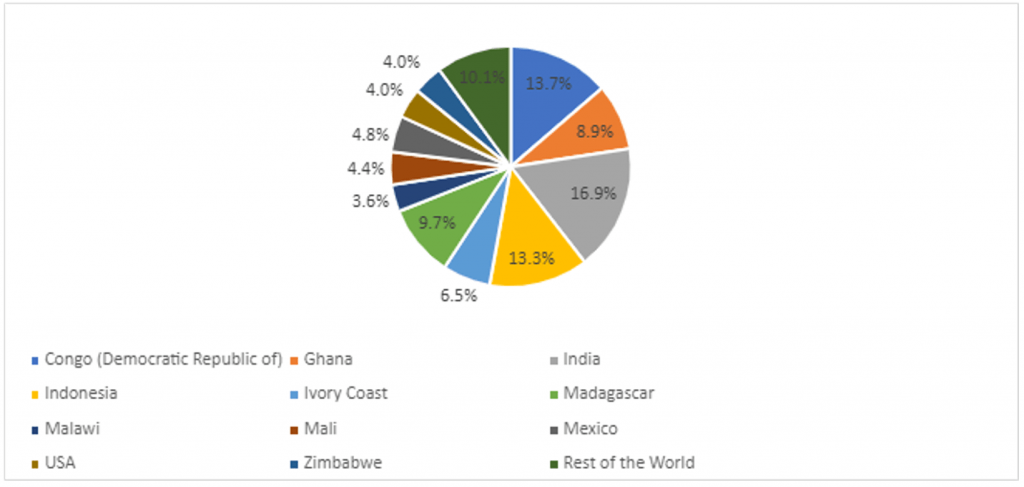
Source: ISS ESG Norm-Based Research data
Growing Momentum for Mandatory Human Rights Due Diligence
The rising reports of child labor violations come at a time of growing international regulatory pressure on companies to conduct human rights due diligence along their value chains to identify, prevent, mitigate, and account for how they address their impacts on human rights. Examples of such reporting or due diligence laws include the French Duty of Vigilance Law, the German Act on Corporate Due Diligence in Supply Chains, the UK Modern Slavery Act, and the Australian Modern Slavery Act.
In the U.S., California anticipated these trends with the 2012 California Transparency in Supply Chains Act. In 2021, President Biden signed the Uyghur Forced Labor Prevention Act (UFLPA) into law, which requires due diligence for companies using supplies and materials from the Chinese Xinjiang Uyghur Autonomous Region. Nevertheless, the US lacks broader, mandatory human rights due diligence legislation at the federal level.
In response to the recent child labor reports, the U.S. government has created an interagency task force to combat child labor exploitation. Among other measures, the Department of Labor’s Wage and Hour Division will launch a national strategic enforcement initiative to conduct investigations where child-labor violations are most likely to occur. In February, the Labor Department announced the resolution of one of the largest child labor cases in the department’s history against Packers Sanitation Services, Inc. LTD.
Meanwhile, the European Union’s proposed Directive on Corporate Sustainability Due Diligence mandates companies to respect human rights and the environment along their value chains. The directive goes beyond existing national regulations in EU member states and other countries. The EU Parliament is due to adopt its final position in May 2023 and a final text may be agreed on by the Commission, Council, and Parliament later in the year.
The EU directive will apply not only to companies incorporated in the EU but also non-EU companies that generate more than €150 million net turnover in the EU. For high-risk industries (Textiles, Agriculture, Minerals), the threshold lies at €40 million.
U.S. companies may thus fall under the EU directive’s human rights due diligence regime if they surpass the above mentioned thresholds of doing business in the EU. The directive also will likely have an impact on U.S. companies supplying EU companies, as EU companies covered by the regulation will pass labor rights, human rights, and environmental standards on to their suppliers and business partners.
Results of the Modern Slavery Scorecard Indicate US Companies Lag behind EU Peers
Designed by ISS ESG, the Modern Slavery Scorecard (MSS) enables investors to identify, evaluate, and act on modern slavery risks and their impact on investments by providing a holistic assessment of a company’s modern slavery risks across its operations and supply chain, its exposure to modern slavery controversies, and its modern slavery risk mitigation. Modern slavery includes the worst forms of child labor.
A main component of the MSS, the Modern Slavery Disclosure and Performance Score, evaluates whether a company: 1) has strong systems to identify modern slavery risks, 2) acts on potential risks and on actual incidents of modern slavery, and 3) ensures workers have the fundamental labor standards that protect against exploitation. The assessment for this score includes a check of policies and procedures on forced labor and child labor.
Each company is assigned a Disclosure & Performance Category, based on its Disclosure & Performance Score (Figure 2).
Figure 2: Modern Slavery Disclosure and Performance Score Categories

- Laggard: The company lacks transparency in its approach to modern slavery and does not disclose adequate policies and procedures to identify and mitigate modern slavery risks.
- Medium Performer: The company has disclosed some policies and procedures to identify and mitigate modern slavery risks but is yet to demonstrate good practice.
- Outperformer: The company has disclosed several policies and procedures to identify and mitigate modern slavery risks, and the quality of some of these disclosures demonstrates good practice.
- Leader: The company has disclosed comprehensive policies and procedures to identify and mitigate modern slavery risks, and the quality of these disclosures demonstrates good practice. Leading companies typically disclose a policy commitment to prohibit forced labour and child labour, along with robust measures to ensure standards on wages, working hours and union rights for employees and workers in its supply chain are upheld.
Source: ISS ESG
Leveraging the ISS ESG Corporate Rating, an analysis of companies from the high-risk Automobile, Food Products, and Retail industries showed significant differences between the ones incorporated in the U.S. and the ones incorporated in the European Union. These differences are particularly relevant with regard to forced and child labor due diligence, as measured by the ISS ESG Modern Slavery Scorecard.
In the Automobile industry, 70% of companies incorporated in the EU are classified as Outperformers by the Modern Slavery Disclosure and Performance Score. This starkly contrasts with their counterparts in the U.S., where only 14% outperform their peers.
In Food Products, 67% of U.S. companies are Laggards, while only 13% of EU companies fall into this category. In the Retail industry, 69% of companies incorporated in the U.S. are classified as Laggards, versus 30% in the EU (Figure 3).
Figure 3: Distribution of EU and U.S. Companies by Modern Slavery Disclosure and Performance Category
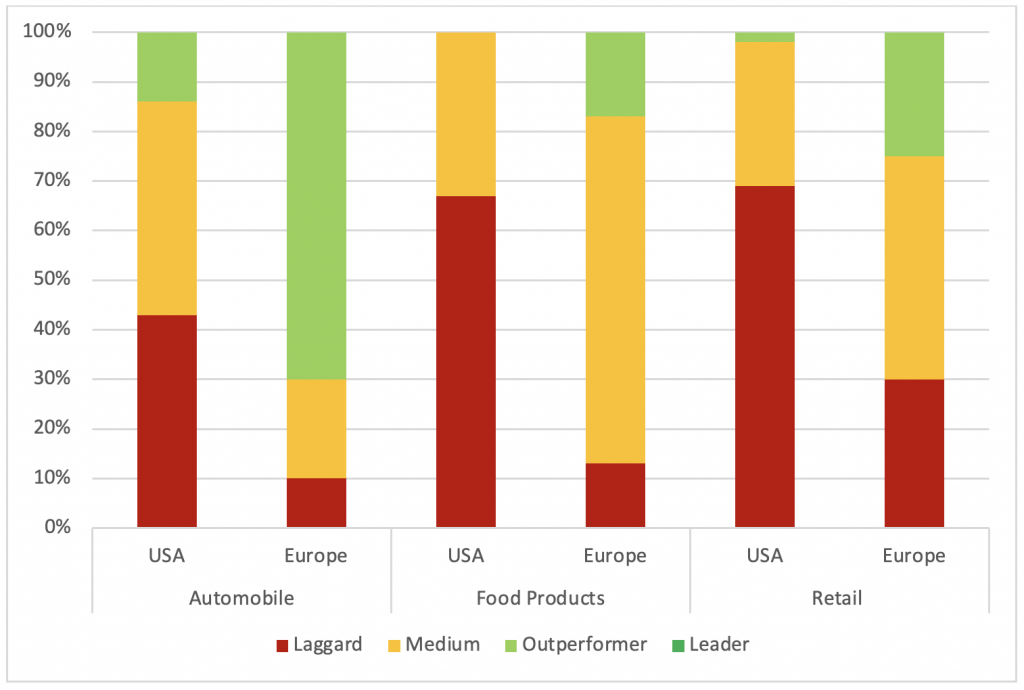
Source: ISS ESG Modern Slavery Scorecard data
What Does This Mean for Companies and Investors?
Modern slavery, which includes the worst forms of child labor, typically occurs on a continuum where workers experience a gradual erosion of their working conditions. This erosion can involve underpayment of wages, excessive overtime, and hazardous work. Also, well-documented links exist between modern slavery and other human rights challenges, including corruption, discrimination, and marginalisation of ethnic minorities and forced displacement.
The Modern Slavery Disclosure and Performance Score draws on relevant human rights and labour rights indicators, along with reported incidents of modern slavery. The indicators covered by the score specifically assess a company’s approach to ensuring decent wages and fair business practices, protecting workers’ rights to freedom of association and collective bargaining, managing non-regular employment, setting labor standards for suppliers and contractors, monitoring compliance with these standards, and taking measures to improve working conditions at key suppliers.
Implications for Companies
Of these Modern Slavery Disclosure and Performance Score indicators, U.S. companies tend to have adequate policies on freedom of association and collective bargaining. They score low, however, on the measures to ensure such freedom of association and to facilitate collective bargaining. This disparity suggests that while a certain awareness of the topic’s importance exists, there is a gap with regard to actually implementing measures to ensure employees are aware of and can exercise their rights. This is significant, because the ability of workers to raise grievances and be involved in the decisions that impact their working conditions are key preventative factors against exploitation. The International Labour Organization considers freedom of association and the right to collectively bargain as “enabling” rights for all other rights at work.
U.S. companies also score low on their non-regular employment policies, as well as on measures to enable key suppliers to safeguard labour rights and improve working conditions. The indicator on non-regular employment reflects a company’s use of different employment types and employment contracts, as well as its management of the possibly negative effects of these types of non-regular employment. It is worth noting that in some of the cases of child labor violations investigated by the New York Times, companies and their subcontractors actively relied on staffing agencies to supply workers. As pointed out by the International Labour Organization, non-standard forms of employment, such as subcontracted labor, pose risks for workers, including violations of their fundamental rights at work, such as discrimination and forced labour.
Companies can expect to be increasingly scrutinized in this regard, as the U.S. Department of Labor has announced that its new efforts to combat exploitative child labor include a goal to “Hold All Employers Accountable.” According to the Labor Department, the increased reliance on staffing agencies and subcontracting means host companies often claim that they are unaware of or unable to control child labor issues happening at their worksites.
Labor rights among suppliers is another concern for U.S. companies, as many major brands implicated in recent child labor allegations are involved through complex networks of suppliers and contractors. Even companies not directly involved in child labor might have conducted insufficient labor and human rights due diligence on their supply chains.
Companies can use due diligence to identify risks in their value chain and build resilience to sudden changes and disruptions. More robust supply chain due diligence also helps companies to be prepared for increasing international mandatory due diligence regulations and to avoid reputational risks in the context of increasing customer awareness and boycott campaigns.
Implications for Investors
On their side, investors may wish to monitor the international development towards mandatory human rights due diligence. In some jurisdictions, the legislative requirements extend to investors. Australia’s Modern Slavery Act, for example, explicitly requires investors to report on modern slavery risks in their investment and lending activities. The degree to which the EU directive’s mandatory due diligence rules will apply to the financial sector is still under discussion.
Investors may also welcome the move towards mandatory corporate sustainability due diligence, given that such a development can increase transparency and the robustness of corporate risk management processes.
ISS ESG offers a set of tools, such as Norm-Based Research, the ISS ESG Corporate Rating, and the Modern Slavery Scorecard to help identify companies involved in adverse social and environmental impacts along their value chains and recognize leaders and laggards in value chain due diligence.
Explore ISS ESG solutions mentioned in this report:
- Identify, evaluate and act on modern slavery risks and their impact on investments with the Modern Slavery Scorecard.
- Assess companies’ adherence to international norms on human rights, labor standards, environmental protection and anti-corruption using ISS ESG Norm-Based Research.
- Identify ESG risks and seize investment opportunities with the ISS ESG Corporate Rating.
Authored by:
Lisa Häuser, Sector Lead, Consumer, ISS ESG
Mirtha Kastrapeli, Sector Head, Consumer, ISS ESG
Christopher Kuales, Associate Vice President, ESG Products, ISS ESG
Roma Makati, Associate, Norm Based Research, ISS ESG
Daniel Parris, Associate, Methodology, ISS ESG
